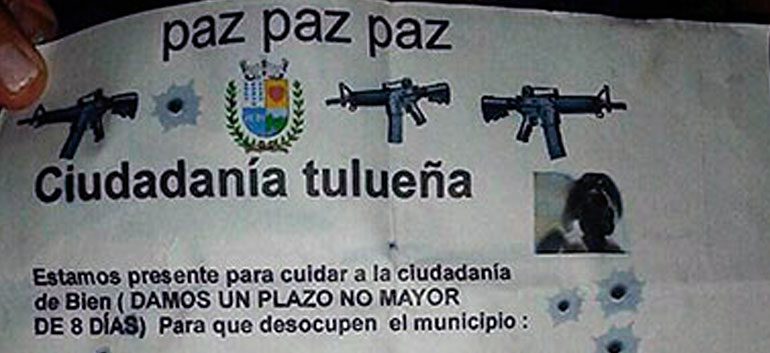A widely circulated pamphlet in a western Colombian town threatening “social cleansing” is being investigated by authorities for its authenticity, reported local media Monday.
The pamphlets, distributed in Tulua, a town located northeast of Cali in the western Valle del Cauca state, were signed by an unknown group, “Grupos Unidos por Colombia” (United Groups for Colombia — GUPC), reported Cali’s El Pais newspaper.
#ValleDelCauca. Temor en #Tuluá por circulación de panfletos amenazantes http://t.co/ecw1dKRqOmpic.twitter.com/GJJ2d91jYJ
— Elpais.com.co (@elpaiscali) July 6, 2014
The authors warn “extortionists, kidnappers, drug dealers, thieves” to leave the municipality within eight days, so that business owners will not have to pay “any sort of extortion.”
As is typically the case in these incidents, the pamphlet also enforces a curfew for residents. “Fathers of the family, don’t let your children go out past nine o’clock, or we will put them to bed for you,” the pamphlets reportedly read.
“We must say that this supposed group of delinquents attributed to the authorship [of the pamphlet] does not exist in the municipality of Tulua,” said the captain of Tulua’s police force. Nevertheless, police assured they would be working on the case to determine the authenticity of the pamphlets, according to the national El Espectador newspaper.
Until the group’s identity and the legitimacy of the threats can be ascertained, however, residents will have cause to fear. “All the rats of Tulua need to be killed,” read the pamphlets. “Watch out, because we will be going to your home to distribute lead [bullets].”
Tulua is located in close proximity to the coastal port of Buenaventura, the site of an ongoing turf war between national narco powers. Various armed groups operate within Valle del Cauca and the Pacific region as a whole, where much of the violence in Colombia’s armed conflict is currently concentrated.


